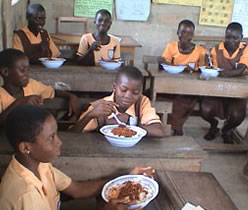Gender Ministry condemns attack on school feeding caterers
 The Ministry of Gender, Children and Social Protection regrets pockets of attacks against caterers of the Ghana School Feeding Programme (GSFP) in some areas in the country following the change of government.
The Ministry of Gender, Children and Social Protection regrets pockets of attacks against caterers of the Ghana School Feeding Programme (GSFP) in some areas in the country following the change of government.
“We are also aware that some individuals are instructing caterers to discontinue catering services they are providing to some Ghana School Feeding Programme beneficiary schools.
“The only authority mandated to abrogate, suspend or call for reconsideration of caterer contracts on the GSFP is the Ministry of Gender, through the GSFP,” Mr. Kwesi Armo-Himbson, Chief Director of the Gender Ministry stated in a statement copied to the Ghana News Agency in Accra on Monday.
The statement said as part of plans to expand the beneficiaries on the GSFP to 1.3 million, the programme will be recruiting new caterers.
The statement said adverts will be placed in various media for this purpose. “All caterers interested in providing services on the GSFP are directed to their District Assembly Offices to pick up application forms and apply accordingly.
“As part of the recruitment process successful applicants will undergo medical screening and training to ensure persons identified deliver safe and quality services to beneficiaries on the Programme.
The statement directs all interested applicants to contact Alhaji Siiba, Public Relations Officers GSFP through: +233 244 690 137
The Government in 2015 changed the sectoral responsibility for the Ghana School Feeding Programme (GSFP) from the Ministry of Local Government and Rural Development to the Ministry of Gender, Children and Social Protection.
The GSFP is a social intervention by government to help boost enrolment in public basic schools and the nutritional needs of basic school children. The policy, meant to provide one nutritious meal each school day for all infant and primary school children from 4 -12 years.
The programme was established in 2005 by Ghana and the Dutch Government as a means to boost domestic food production and increase school enrolment, attendance and retention among kindergarten and primary school children.
The programme was inspired by the Comprehensive African Agriculture Development Programme, Pillar three of NEPAD under the recommendations of the United Nations Millennium Task Force on Hunger.
Source: GNA
